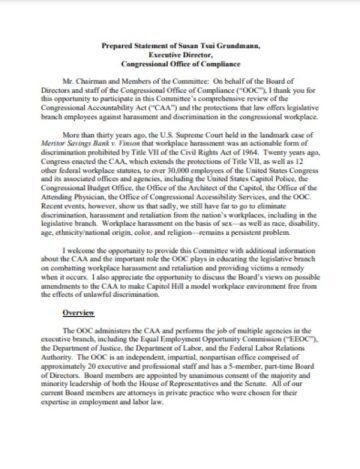Mr. Chairman and Members of the Committee: On behalf of the Board of Directors and staff of the Congressional Office of Compliance (“OOC”), I thank you for this opportunity to participate in this Committee’s comprehensive review of the Congressional Accountability Act (“CAA”) and the protections that law offers legislative branch employees against harassment and discrimination in the congressional workplace.
More than thirty years ago, the U.S. Supreme Court held in the landmark case of Meritor Savings Bank v. Vinson that workplace harassment was an actionable form of discrimination prohibited by Title VII of the Civil Rights Act of 1964. Twenty years ago, Congress enacted the CAA, which extends the protections of Title VII, as well as 12 other federal workplace statutes, to over 30,000 employees of the United States Congress and its associated offices and agencies, including the United States Capitol Police, the Congressional Budget Office, the Office of the Architect of the Capitol, the Office of the Attending Physician, the Office of Congressional Accessibility Services, and the OOC. Recent events, however, show us that sadly, we still have far to go to eliminate discrimination, harassment and retaliation from the nation’s workplaces, including in the legislative branch. Workplace harassment on the basis of sex—as well as race, disability, age, ethnicity/national origin, color, and religion—remains a persistent problem.
I welcome the opportunity to provide this Committee with additional information about the CAA and the important role the OOC plays in educating the legislative branch on combatting workplace harassment and retaliation and providing victims a remedy when it occurs. I also appreciate the opportunity to discuss the Board’s views on possible amendments to the CAA to make Capitol Hill a model workplace environment free from the effects of unlawful discrimination.
Overview
The OOC administers the CAA and performs the job of multiple agencies in the executive branch, including the Equal Employment Opportunity Commission (“EEOC”), the Department of Justice, the Department of Labor, and the Federal Labor Relations Authority.

